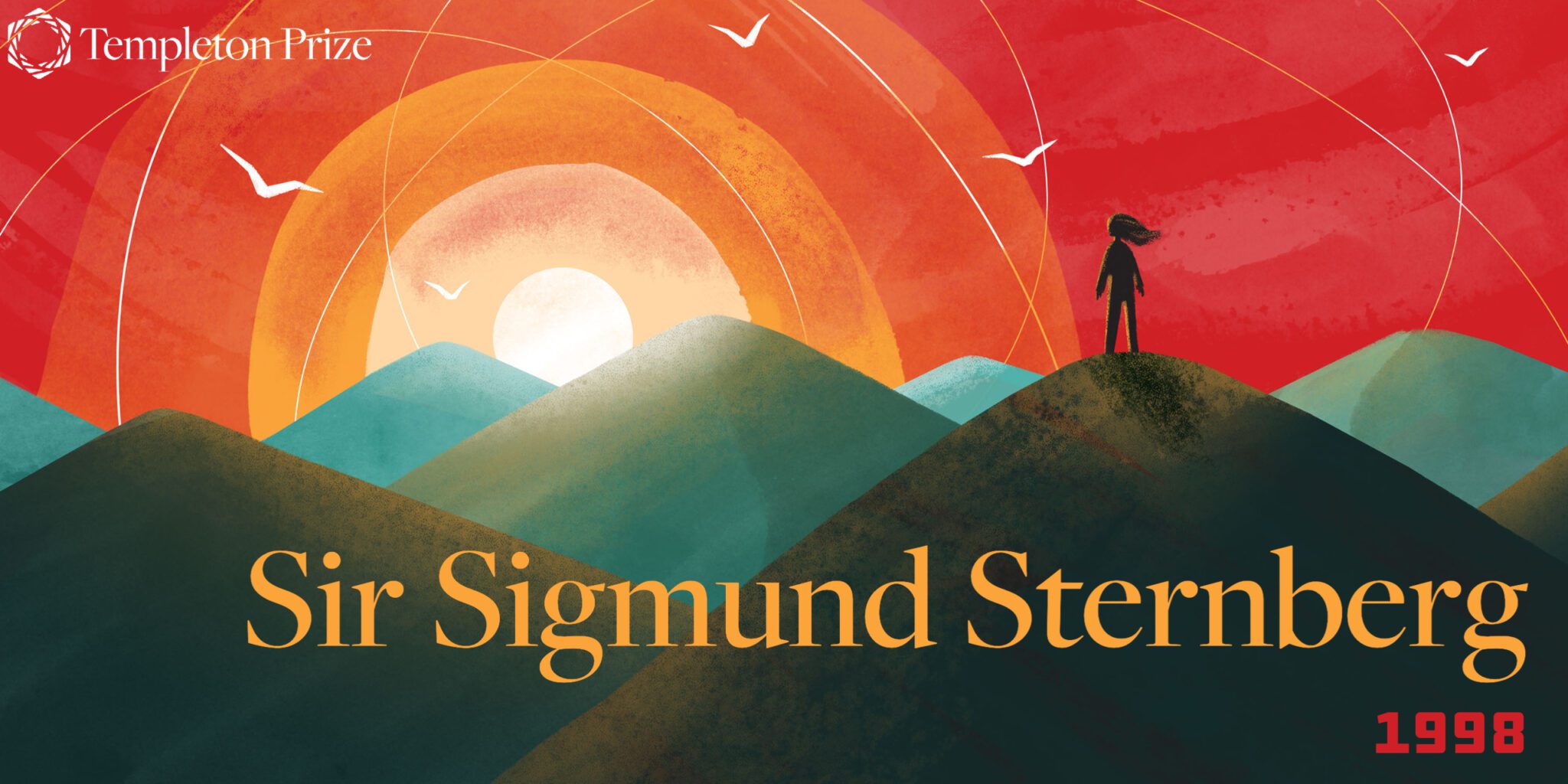In 1973, the first Templeton Prize was given to Mother Teresa. In 2023, we celebrate the 50th anniversary of this award. Over the next 52 weeks, we will highlight each of our laureates and reflect on their impact on the world. From humanitarians and saints to philosophers, theoretical physicists, and one king, the Templeton Prize has honored extraordinary people. Together, they have pushed the boundaries of our understanding of the deepest questions of the universe and humankind’s place and purpose within it, making this (we humbly think) the world’s most interesting prize.
Born in Hungary in 1921, Sigmund Sternberg entered a world that was on the verge of major upheaval.
His childhood experiences as a Jew during the rise of Nazism in Europe informed his interest in interfaith relations. Due to a hostile social climate for Jews, Sternberg emigrated to the UK in 1939. Though Hungary was not at war with Britain, he was classified as a “friendly enemy alien” and could not attend school. Sternberg went to work in metal recycling and ultimately established his own business.
His business was successful, and in 1965 Sternberg was able to sell his company and begin his charitable career supporting causes related to interfaith dialogue. He established the Sternberg Foundation in 1969, which was dedicated to promoting peace between the Abrahamic faiths, and formed the Sternberg Centre for Judaism in 1981. Sternberg went on to assist in the creation of the Three Faiths Forum in 1997 to promote mutual understanding between Islam, Christianity, and Judaism.
Sir Sigmund Sternberg is perhaps best remembered for quiet diplomacy in relocating a Carmelite convent that had been established at the site of the Nazi concentration camp at Auschwitz in the mid-1980s. Many considered the camp’s presence offensive in a setting where so many Jews had been massacred during the Holocaust. Sternberg negotiated with Poland’s Catholic primate, Jozef Cardinal Glemp, for the removal of the convent, and it was eventually removed in 1993. He is also remembered for facilitating the first-ever papal visit to a site of Jewish worship in 1986, and cultivating the links which led to the recognition of the State of Israel by the Holy See in 1993.
In recognition of his tireless efforts as an interfaith campaigner to improve relations between Jews, Christians, and Muslims, Sir Sigmund Sternberg was awarded the Templeton Prize in 1998. He received the Prize from HRH Prince Philip, the Duke of Edinburgh, in a private ceremony at Buckingham Palace in London. Remarks were delivered by Dr. John Templeton Jr., businessman Maurice Strong, and United Nations Secretary-General Kofi Annan.
“Sir Sigmund has pioneered and proved inter-religious dialogue as a new force for reconciliation and the understanding of God. He has pointed to the need for a much more effective holistic cooperative work for peace and justice, for dynamic ethics and renewed spirituality. He is bringing his vision of “Shalom” to make religion not a constraint, but a liberating and reconciling force.
The progressive and visionary thinking of Sir Sigmund, tempered by his experience as a businessman and as a successful mediator in inter-religious tensions, leads one to take very seriously the challenge that Sir Sigmund is bringing. He is not satisfied with continuing or consolidating his many remarkable initiatives of the past, but he is launching an inspiring new enterprise that will seek to challenge the world’s business community. Sir Sigmund has used multiple methods and approaches, not only to help solve immediate problems, but also to prevent such problems for future generations. When many have only looked back, he has looked forward; when many have looked only at their own community, he has looked at the needs of his neighbours. He has not been bound by religion, but has been empowered by his faith to liberate himself and others from the bonds of discrimination and prejudice. His own religious community has acknowledged his leadership.”
— Dr. John M. Templeton, Jr.
“I do not understand why businessmen are not more widely engaged in interfaith activity. Peace in the community, peace in the world, is in their total interest. It is absolutely to their benefit that the society in which they live, in which they trade, in which they raise their families, is a stable one with a sense of values. The jungle is not conducive to a sense of commerce.
In my travels to all corners of the globe in the pursuit of interfaith understanding, I have come across men and women of all religions who earn their living in business and in commerce who are sustained by and believe in a power for good greater than themselves. That is the power we call God.
The people, merchants, traders, bankers, shop- keepers, comprise a vast global resource for human betterment which has scarcely been tapped. These are people, like few others, with an absolute stake in a stable society, at home and abroad.
What’s more, these are people who know how to dialogue.
They are doing it all day long in the marketplace. These are people who know how to listen to others. If they did not, they would not profit from opportunity.
They are trained in the art of dialogue like few others — and they are out there, on every continent, in every land, every city, even every village, a huge army of intelligent communicators whom we must harness as leaders in that great global conversation which has to take place before we can truly say “all men are brothers.”
— Sir Sigmund Sternberg
Still Curious?
Learn more about Sir Sigmund Sternberg.
